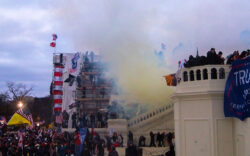“Trial of the century”? Don’t believe the hype.
When former football great O.J. Simpson was tried and acquitted of double murder in a California courtroom nearly 30 years ago, the sensational legal drama was hyped as “the trial of the century” in media reports at the time. The “trial of the century” phrase was again bandied about when Simpson died last month.
With its mixture of race, sex, murder, police mistrust, West Coast celebrity and football fandom, Simpson’s trial was a months-long TV soap opera with a controversial conclusion, but to call it “the trial of the century” then or now ignores other historic courtroom dramas of the 20th century. Even famed attorney F. Lee Bailey of Simpson’s legal “dream team” seemed exasperated with the term when he told The Washington Post in 1999, “Every time I turn around, there’s a new ‘crime of the century.’”
Many 20th century trials in American history could be called trials of that century, including the ‘60s-era Chicago show trial of antiwar activists, but an earlier trial in Massachusetts also brought politics into the courtroom. In 1920, two Italian immigrants and anarchists, Nicola Sacco and Bartolomeo Vanzetti, were arrested on charges of murdering two factory employees during a payroll robbery. Prejudice against immigrants from Italy and a raging post-World War I “Red Scare” in America boiled over in the courtroom crucible of Judge Webster Thayer, who was overheard calling the defendants “those anarchist bastards.” In his charge to the jury, the judge called the two men “morally culpable” even though their guilt and the fairness of their trial were doubted by millions in America and abroad.
Lengthy trials and appeals put the Sacco and Vanzetti case in the headlines for years as the men fought their death sentences. Demonstrations ranging from peaceful vigils to full-scale riots took place all over the U.S. and around the world as the execution date for the two prisoners drew near. An international roster of writers, scientists, artists and intellectuals—including Dorothy Parker, John Dos Passos, H.G. Wells, George Bernard Shaw, Upton Sinclair, Edna St. Vincent Millay and Albert Einstein—rallied for justice for the condemned anarchists. It was not to be. Sacco and Vanzetti were executed in the electric chair in 1927. After their deaths, artist Ben Shahn created paintings and a mural immortalizing “The Passion of Sacco and Vanzetti.”
To this day, the guilt or innocence of Sacco and Vanzetti are debated. In 1991, historian Paul Avrich wrote that “the case against them remains [unproven]. Nor, on the other hand, can their innocence be established beyond any shadow of doubt.” The dubious case against the two anarchists captivated this country and put some of the roar into the decade called the Roaring Twenties. Vanzetti’s last speech to the court still packs poignancy and power nearly a century after his execution: “Never in our full life could we hope to do such work for tolerance, for justice, for man’s understanding of man, as now we do by accident.”
While the Sacco and Vanzetti trials were happening, another trial in rural Tennessee captured the attention of Americans. John Scopes was a young teacher who was brought to court in 1925 for violating a state law barring the teaching of the scientific theory of evolution in his classroom. The trial was a media circus dubbed “the monkey trial” and called—of course—“the trial of the century.” Firebrand lawyer Clarence Darrow represented science during the trial, while perennial presidential candidate William Jennings Bryan battled for religious fundamentalism and against the theory of evolution. Bryan won in the courtroom, but Darrow won in the bar of history. In his 1997 book Summer of the Gods, former University of Georgia professor Edward Larson wrote that the term “trial of the century” has often been used “but only the Scopes trial fully lives up to its billing by continuing to echo through the century.”
Today’s legal battles by Donald Trump are being called the trial of the 21st century. They may not live up to that appellation, but they do show what Martin Luther King Jr. meant when he said, “Judicial decrees may not change the heart, but they can restrain the heartless.”
Like what you just read? Support Flagpole by making a donation today. Every dollar you give helps fund our ongoing mission to provide Athens with quality, independent journalism.









